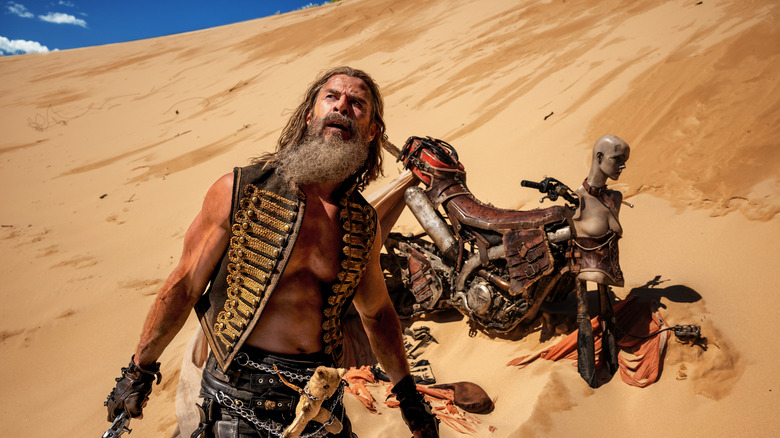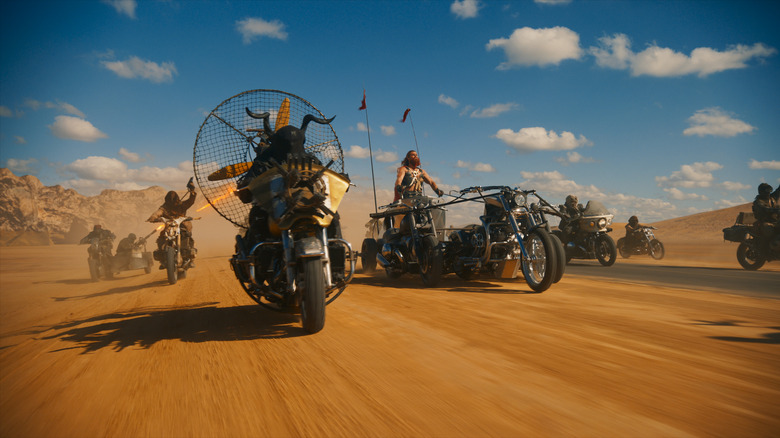Furiosa Review: It’s No Fury Road, But Still A Lovely Day
“Furiosa: A Mad Max Saga” is a good movie that has either the fortune or the misfortune of existing as a prequel to a nearly perfect movie. Fortunate because the direct connections between “Furiosa” and “Mad Max: Fury Road” enrich one another’s stories, and unfortunate because “Furiosa” can’t possibly deliver the surprise and satisfaction of George Miller’s previous “Mad Max” entry.
This prequel must manage a balancing act of trying to recapture some of the thrills of “Fury Road” while also telling a bigger story very differently. The familiar bits work great (in parts), and the new stuff also works great (in parts) — but over 2.5 hours, it might contain too many parts for it to all come together as great as you might want. Unique as it can try to be, it’s always going to live in the shadow of the film it has to keep reminding you about. It’s the DLC that just so happens to be longer than the base game.
And yet if the problems holding it back from masterpiece/best of the series status are insurmountable, “Furiosa” is still something special by ordinary movie standards. I’d be shocked if any of this summer’s other blockbusters had cooler action sequences, more richly imagined worlds, or featured more awe-inspiring imagery — though it oddly won’t be the year’s best super-long, half-a-story, Warner Bros.-produced desert epic involving Anya Taylor-Joy.
Chris Hemsworth’s Dementus steals the show
Where “Mad Max: Fury Road” was one big fast-paced, almost non-stop chase sequence built on the bones of a simple yet powerful sci-fi allegory, “Furiosa: A Mad Max Saga” is almost its photo negative — a slower, more narratively complicated post-apocalyptic epic spanning many years, with many smaller fights and chases interspersed as flavoring. The film is divided into five episodic chapters, tracking the life of Furiosa (played by Alyla Browne as a child and Anya Taylor-Joy as an adult) from her childhood abduction from The Green Place to the point where she reaches “Beyond Vengeance” and kickstarts the events of the next movie.
Along the way, George Miller gets to indulge in one of the things he’s best at: making up fascinatingly weird dudes whose elaborate backstories exist just offscreen. Many of your favorite weird guys from “Fury Road” are back: The People Eater (John Howard), Rictus Erectus (Nathan Jones), The Bullet Farmer (Lee Perry). We even get Scrotus (Josh Hellman) from the 2015 “Mad Max” video game, in case you were wondering if that was canon. But then there’s plenty of new weird dudes to obsess over. There’s The History Man (George Shevtsov), the film’s narrator and a human encyclopedia preserving all known history in his clothes and tattoos. There’s The Octoboss (Goran Kleut), a biker gang leader with an octopus aesthetic and minions who use homemade Da Vinci-style flying machines. And there’s a War Boy named Pissboy (Darcy Bryce), who drinks piss!
The biggest and loudest presence of all of these new weird dudes is Dementus (Chris Hemsworth), the main villain who’s loathsome enough to explain why Furiosa would ever strategically side with “Fury Road” villain Immortan Joe (Lachy Hulme). Hemsworth brings some of the humor that enlivened Thor in the Marvel Cinematic Universe to this teddy bear-carrying scam-happy warlord, and mixes that humor with a sense of unadulterated ruthless cruelty. He steals the show here similar to how Charlize Theron’s Furiosa did in “Fury Road.”
Amidst this colorful supporting cast, Furiosa herself spends much of the movie bearing her name a more muted presence — literally so, as she refuses to speak for much of the movie. Browne and Taylor-Joy deliver almost their entire performances just through the looks in their eyes, with the latter mostly only talking in her relationship-building scenes with Praetorian Jack (Tom Burke) and her final showdown against Dementus. From interviews with Taylor-Joy, it sounds like this role was punishing to perform, but she nails the character’s evolution: the transition between Browne and Taylor-Joy’s segments is so seamless you feel like you’re watching the same person grow up over time, and Taylor-Joy’s portrayal grows into a perfect match for Theron’s by the film’s conclusion.
Can you make it epic?
Many of the artists who won Oscars for “Mad Max: Fury Road” (costume designer Jenny Beavan, editor Margaret Sixel, production designer Colin Gibson, makeup artist Lesley Vanderwalt) have returned for “Furiosa: A Mad Max Saga,” bringing a similar high standard to the prequel’s craft. The biggest change-up in the crew is the cinematographer, with Simon Duggan replacing John Seale. Duggan’s look for “Furiosa” heightens the already exaggerated qualities of Duggan’s “Fury Road” style, which is both a stylistic choice for the prequel’s mythic qualities and a practical one in consideration that less of what we’re seeing onscreen is, well, real.
The meme that “Fury Road” was made entirely with practical effects and no CGI is a lie — it had thousands of digital effects shots in terms of both compositing and computer-animated environments. However, it did an amazing job making most of its CGI unnoticeable, a feat that “Furiosa” fails to repeat. This is less bothersome in the scenes with obvious computer-animated elements (which tend to be for things both impossible to film safely in live-action and utterly badass) than it is for the many moments of obvious green screen. The conditions that allowed for so much beautiful on-location shooting for “Fury Road” can’t be replicated (and for good reason — they drove over the Namib Desert so much it caused environmental damage!), and there are still some amazing practical effects in “Furiosa,” but it’s a less consistent experience.
Thinking about the relationship between “Fury Road” and “Furiosa,” I’m reminded of another two-part female revenge epic: “Kill Bill Vol. 1” and “Vol. 2.” In style, “Fury Road” is more like the thrill ride of “Vol. 1” and “Furiosa” like the slow-burn character study of “Vol. 2.” In substance, the comparison is reversed: “Furiosa” and “Vol. 1” are the set-up to which “Fury Road” and “Vol. 2” are the payoff. As someone who prefers the style of “Kill Bill Vol. 1” and the substance of “Kill Bill Vol. 2,” of course I’m going to like “Fury Road” much more than “Furiosa.” And yet perhaps the biggest compliment I can give “Furiosa” is that this prequel made nine years later feels as inseparable from its predecessor as the two “Kill Bill” sections feel from each other.
“Furiosa: A Mad Max Saga” opens in theaters on May 24.




